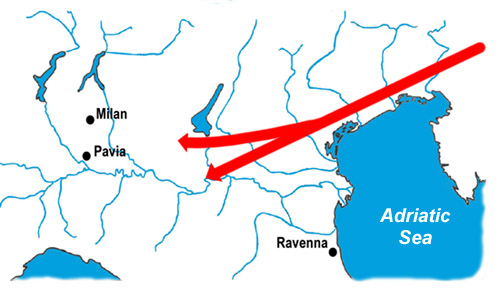Alboin, King of the Lombards
Reigned 565-573If the traditional account is true, Alboin, King of the Lombards, engineered one of Europe's first great real estate transactions.With the decline of the Huns following the death of Attila, 453, the Lombards had moved to ascendency in the area known as Pannonia, centered around modern-day Hungary. Warfare with the Gepidae was constant, and another tribe, the Avars, had begun migrating into the area from Asia as well. After succeeding his father on the Lombard throne in 565, Alboin soon struck an alliance with the Avars and together they crushed the Gepidae. Alboin killed Cunimund, the Gepidae king, and took the king's daughter Rosamund as his wife.
Then in April 568 Alboin fulfilled his bargain with the Avars by launching his Lombard followers on a mass migration southwestward into Northern Italy, leaving Pannonia for the Avars.

The withered forces of the Roman Empire that remained in Italy, based at Ravenna, were no match for the overwhelming Lombard incursion. Residents of the Italian countryside fled at the Lombards' approach. Some retreated to the barrier islands along the shore of the Northern Adriatric Sea, where they became part of the nascent Venice.
By September of the following year Milan, Pavia (which Alboin chose as his new capital) and the other large cities of Northern Italy had fallen. The Lombard kingdom in Italy had been firmly established.
The kingdom was to last for more than 200 years, until falling to Charlemagne's Frankish forces, 774. Alboin himself, however, soon fell to an old grudge: he was murdered in 573, apparently at the instigation of his wife Rosamund, who never accepted her husband's habit of drinking from her father's skull.
Comments?
© 1998-2000 C. I. Gable